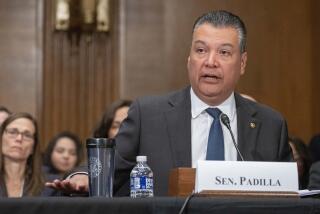900-Line for Sex Info to Feature the Masters Touch
- Share via
TORONTO — Thirty years after initiating his pioneering research on sexuality, Dr. William Masters says he is so disappointed by Americans’ many misconceptions about sex that he is trying a thoroughly modern approach: the “900” telephone hot-line.
“So much of sexual disorders and dysfunction is based on ignorance and lack of education,” said Masters, a featured speaker at the American Psychological Assn. annual meeting, which concludes today. “If I can’t get information to the public through professionals, I’ll get it to the public myself.”
Masters said a “massive” advertising campaign and a 30-minute television infomercial will help publicize the service, planned to launch nationwide in October. He emphasized that he is deeply committed to getting sex education to the public “one way or the other.”
Masters, 77 and recently remarried (he and longtime research partner Virginia Johnson divorced in March), said he has grown increasingly dismayed that decades of groundbreaking scientific work in sexology hasn’t moved beyond textbooks and therapists’ offices to reach the general public.
“I’m frustrated because the knowledge is available. But research does little or no good if you can’t disseminate it,” he said. “If we can educate people, we will eliminate a lot of time and effort treating sexual dysfunction.”
Masters stressed that the hot line will be for information only. “We will not be doing therapy over the phone,” he said. He says information alone will resolve many of the still widely believed myths, including:
* Sexual desire ceases in the elderly.
* The male is responsible for a female partner’s sexual satisfaction.
* The size of the penis is important to satisfaction.
“The male definitely has greater handicaps,” Masters said. “He is supposed to be the sex expert in any relationship. In addition, culture tells him he’s supposed to make a woman orgasmic. There is no way he can do this for her.
“So men, especially, wonder ‘What is wrong with me?’ when it’s simply a matter of not knowing what is normal. It’s amazing how much we can improve and treat sexual dysfunction if we neutralize misinformation.”
Masters, who was trained in obstetrics and gynecology, criticized medical doctors for neglecting to learn sexology and educate their patients.
“With limited exceptions . . . medicine has openly adopted the public’s belief that sex research and sex therapy are not professionally acceptable health-care interests,” Masters said.
Despite the wealth of books, magazines and TV talk shows that discuss sex, Masters said there is far too much censorship for the majority of Americans to become enlightened.
“I’ve concluded that it’s impossible to do sex education in the public arena,” he said. The 900 line “is the only way we can think of to do it.”
*
In the twilight of his career and stricken with Parkinson’s disease, Masters is nevertheless revered by therapists and was treated to an emotional ovation at the end of his speech at the psychological association’s meeting Saturday. However, several leading sexologists said they disagreed with Masters’ assessment that the state of Americans’ sexual knowledge is so pitiful.
“I absolutely agree with him that the American adult does not have an ongoing source of information to meet their sexual needs. But I do think Masters and Johnson have had great success over the years in getting their message out,” said Debra Haffner, of the Sex Information and Education Council of the U.S., a nonprofit clearinghouse.
For instance, she said, Masters revolutionized sex education in the 1960s by describing the physiology of female orgasm in the book “Human Sexual Response.”
“Millions of women became orgasmic after that. And now, you can’t pick up a woman’s magazine without seeing a column on sex,” she said.
But Haffner says she can attest to Americans’ continued need for sex education. The clearinghouse receives thousands of calls each year from “panicky people whose problems can be resolved with basic information.”
June Reinisch of the prestigious Kinsey Institute agrees with Masters that Americans are confused by myths about sex, but suggested that there are ways to educate them, such as television and even newspaper comic strips.
The effectiveness of the hot line, Reinisch said, will depend on the training of the therapists.
“If it’s done well, it will be effective. It’s very important to have access to information--and not everybody reads. We need to educate people about sex in all kinds of ways that are interesting and repetitive. People don’t remember something unless they hear it more than once.”
*
Sex education should encompass physiological, psychological and social factors, Masters said. Thus, multi-disciplined therapists (about 500) are being trained to answer the hot line, which will operate 24 hours a day, every day, out of the Masters and Johnson Institute’s St. Louis headquarters.
The service, for adults only, will cost $3.99 a minute with calls held to a maximum of 30 minutes. Callers will be asked to give their birth dates; if there is uncertainty about the age, institute officials said they will terminate the call.
Masters promises quality and information tailored to the individual question. “There will be no canned answers,” he said.
Paid telephone counseling services have become a recent trend, although they are controversial. Critics have voiced concern that someone in need of therapy may call a 900 line looking for a quick fix.
Haffner said that while she does not doubt that members of Masters’ staff will be well-trained. “They are going to have to help people figure out quickly--because people are paying for this service--whether they need to be referred to counseling.”
Masters’ reputation should help elevate the service above others that are available, said renowned sexologist Albert Ellis.
“This seems like a very good idea,” he said. “It’s interesting because they are educating people and not exploiting them.”
Indeed, the service itself may be more subject to exploitation, Haffner said.
“I know from experience that they will have to deal with a large number of crank or obscene calls.”






